For the average person, choosing between ducks and chickens is often a matter of personal preference, sometimes based on superficial factors like which one is cuter.
But for preppers, there is another layer (no pun intended) to consider when making this decision. The question we’re really asking about chickens versus ducks is, “Which will be easiest to raise when the world is in chaos and food sources are scarce?”
When SHTF, your stockpiled food will only last so long; eventually, you’ll need to start producing your own. The people who thrive will be the ones who can produce nutritious food with limited resources. So, which one is better for preppers, chickens or ducks?
Which Is Easier to Keep, Chickens or Ducks?
If you’re worried about feeding yourself and your family when SHTF, imagine trying to feed a flock of poultry!
You don’t want to end up in a position where you’re competing with them for food sources, but you also want to provide the best possible care. This plant grows almost everywhere in America, and will also double the egg production of your flock.
Options for Housing Chickens and Ducks
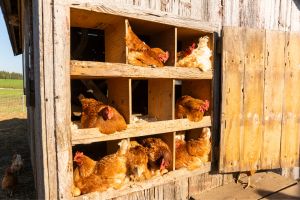 You have a few options when it comes to housing chickens and ducks, and these choices determine how much food you have to provide for them.
You have a few options when it comes to housing chickens and ducks, and these choices determine how much food you have to provide for them.
You can raise chickens and ducks in a few ways: confined in a permanent coop, allowed to range freely about your property, kept in poultry tractors.
There are pros and cons to each method, but with all of them, the most important factors to consider are predation, egg collection, and keeping your flock out of your garden areas during certain times of the year.
Keeping Your Flock in a Coop
Chickens and ducks are both easily raised in coops, and you can even keep them together in one house. If you’re confident you can provide plenty of food and grains for your chickens, they are easier to keep in a coop than ducks.
Ducks are messier than chickens, and they like to have a pool of water, which may be hard to supply when you’re in survival mode. Also, keeping your duck coop clean may be a bigger chore than it’s worth.
Related: Livestock Animals You Should Start Raising For The Upcoming Economic Crisis
The advantages of keeping ducks and chickens in a coop are that you can find their eggs more easily, and they are less likely to become someone else’s dinner. However, that means you need to provide all of their food and water.
Free Range Chickens and Ducks
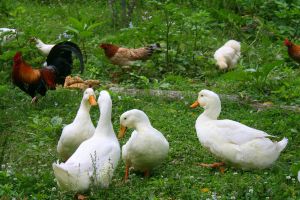
Free-ranging your chickens and ducks has a lot of benefits, but it can also end up in disaster.
When I was a kid, we had a flock of 40 free-range bantam chickens that fed a hungry goshawk all winter.
By spring, there were only 8 chickens left!
Free Ranging Ducks
One of the advantages of ducks is that they prefer a free-range lifestyle and will forage for almost all their own food if they can.
They still need housing to return to at night for safety and to get out of the weather, but for the most part, ducks can pretty much take care of themselves for much of the year.
Cayugas are the best duck breed for free range. They lay fewer eggs than some other breeds, but they are a hardy breed with excellent meat production.
Free Ranging Chickens
Some breeds of chickens are better for free range than others, so it’s important to choose the right breed. Chickens are more susceptible to predators than ducks because they are quieter at night. When they roost, they shut down and very rarely make any noise, and it can be easy for predators like skunks and raccoons to pick them off.
One of the best chicken breeds for free range is the Leghorn. They are excellent foragers with a natural tendency to hunt for insects. Leghorns are small to medium-sized chickens, laying about 280 eggs per year.
Using Chicken Tractors for Chickens and Ducks
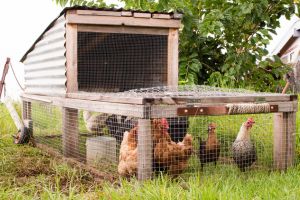 Chicken tractors have become really popular over the last several years, and for good reason. They are used by many poultry producers, combining the advantages of free-ranging and cooping methods.
Chicken tractors have become really popular over the last several years, and for good reason. They are used by many poultry producers, combining the advantages of free-ranging and cooping methods.
Related: 8 Ingenious DIY Chicken Projects
Using a chicken tractor to raise ducks or chickens is healthier for your birds than keeping them in a permanent coop, reducing problems with pests and diseases. It also protects them from predators and makes it easy to find the eggs they lay.
Another benefit of using a poultry tractor is that it boosts the health of your soil. You can move it around your homestead to add fertilizer to your soil, keep weeds down, and reduce insect populations.
The natural foraging abilities of ducks make poultry tractors a top choice when it comes to housing them, and as long as you have some method to provide them with water, they’ll be happy. Since ducks are really messy, the best poultry tractor is one that is tall enough to walk into so that you can clean their water and food dishes.
Ducks vs. Chickens For Eggs and Meat
When it comes to raising poultry for eggs and meat, ducks are a clear winner. In terms of pure caloric value, duck eggs and meat have more calories per gram than chickens.
When you compare the nutritional value of ducks versus chickens, there’s almost no contest, making ducks a serious contender for the prepper lifestyle.
Taste and Nutrition
Duck eggs taste a little different than chicken eggs. They are often described as creamier and richer. They’re also higher in protein and fat than chicken eggs, and they have more folate, iron, selenium, zinc, and vitamins. In fact, one duck egg has 227% of your daily vitamin B12 requirement!
Egg Size
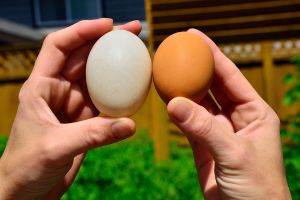 Duck eggs are larger than chicken eggs by about 50%, weighing about 3.5 ounces to a chicken egg’s 2.5 ounces.
Duck eggs are larger than chicken eggs by about 50%, weighing about 3.5 ounces to a chicken egg’s 2.5 ounces.
They’re often used in baking, where one duck egg can replace two chicken eggs.
Related: What You Should Do With Your Eggshells
Choosing the Right Breeds
There are several species of chickens and ducks, and while many breeds can be used for both egg and meat production, a lot of breeds are selected for either one or the other.
While some types of ducks don’t produce as much as some types of chickens, overall, ducks beat chickens in annual egg production. On average, chickens produce about 250 to 300 eggs per year, whereas some duck breeds can produce 300 to 350 eggs per year.
⇒ The Only Plant That Will Make Your Chickens and Ducks Lay Twice as Many Eggs
Whether you choose chickens or ducks, selecting the best breeds can be tough. One thing is for sure, you’ll want a tough breed that will produce eggs, meat, and reproduce on its own.
When to Butcher
While both chickens and ducks can be butchered as young as six weeks of age, young ducks grow faster than chickens. Meat ducks are ready to be butchered at about 6 to 9 weeks, weighing in at 6 to 10 pounds, while meat chickens take 8 to 20 weeks to finish to a similar size.
However, butchering chickens is much easier than processing ducks. Chickens are easier to pluck. A lot of people end up skinning their ducks, but that’s not ideal because the skin contains a lot of fats and flavor.
Other Factors to Consider: Chickens vs. Ducks
Are you Team Duck or Team Chicken? If you’re still undecided, here are a few other factors to consider in the chicken vs. duck debate.
Noise
When it comes to noisy fowls, most people think of loud roosters waking them up at dawn. However, ducks are considerably noisier than chickens. One of the reasons ducks are less prone to predators is that they’ll create a huge ruckus in the middle of the night if they sense they’re being hunted.
Offspring and Life Span
The oldest chicken ever recorded lived to 22 years. Some types of ducks, including Muscovies, commonly live about 20 years when they are properly cared for. However, most domestic ducks and chickens have a lifespan of about 5 to 10 years.
Generally, ducks lay more eggs for a longer time span than chickens. The egg-laying production of ducks doesn’t taper off until they are 7 to 9 years old, while chicken’s egg production tapers off after about 3 to 4 years.
For a prepper, the most important consideration when selecting a duck or chicken breed is how good they are at reproducing. While it seems like they should all be really good at it because they lay eggs all the time, some breeds are broodier than others, and more likely to raise young successfully.
Temperament and Behavior
Ducks and chickens are both pretty friendly creatures, although ducks tend to be calmer and friendlier than chickens.
An important consideration with ducks and chickens is being able to catch them if they get out of their coop. Ducks tend to stay in a group and are easy to herd, while chickens scatter and are very hard to catch. You’re better off keeping the door open and luring them in with feed.
Raising chickens and ducks is a great way to bring food to your table no matter what’s happening in the world. There are pros and cons to raising both, so why not keep some of each? Find a few breeds of each type, raise them all together, and you’ll learn for yourself which fits into your lifestyle the best.
You may also like:
 8 Prepper Projects to Build Before It’s Too Late
8 Prepper Projects to Build Before It’s Too Late
How to Test Soil the Way Pioneers Did (Video)
Knock Knock! It’s FEMA, We Need Your Stockpile
6 Warning Signs Before an Economic Collapse That Most People Miss

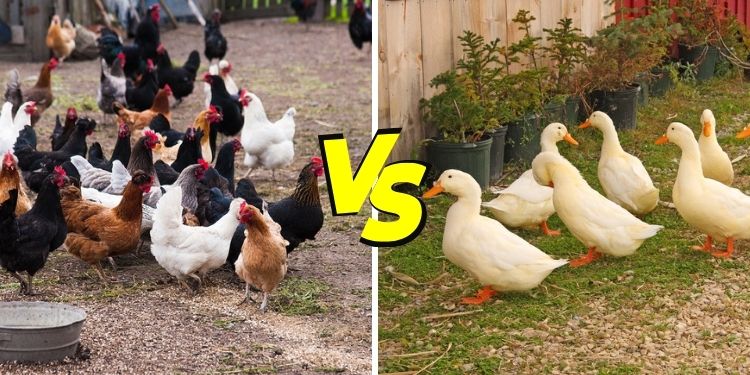



















The biggest part of Chickens or Ducks in free ranging is providing predator protection. Depending on the region of the country there are hawks, raccoons, coyotes. Along with the usual rats, mice and wild birds that can carry certain health diseases to the chickens and ducks. The rats and mice will eat the spilled feed and drink the water. Which they can leave pee and poo in their feeding dishes.
Chickens and ducks are good additions to the food chain for families. It is common in backyard city limits you can’t have roosters because some neighbors do not like the constant rooster crowing.
Unfortunately a rooster would guarantee a sustainable generation source of chickens. Don’t have ducks in the backyard so not sure how noisy the ducks would be in the city limits.
Would love to be in the rural countryside but Bidenomics has made moving there not viable at this time. We seniors on fixed incomes will have a harder time and expenses to move. Bugging situation that is another set of issues for seniors.
Maybe get MAGA being America first again we will have better options to work with.
Don’t forget the two legged predators coming from the open southern Bidenomics border.
Theses people no longer fear police as a NYC video shows illegals pummeling two NYC police. The illegals were on the bus to California, they don’t care if they steal your livestock, chickens, ducks to eat, while your family starves.
This was a great article, I thought going into it Chicken was gonna be the winner, but I was surprised at how much more beneficial ducks could be…
Depending on if you live close to the city, out in the suburbs or closer to the rural areas, ducks require a small pond or small kids swimming pool.
The decision is the chickens can be housed in dryer quarters where ducks need more of a water environment.
Both will survive in the city to rural areas as said it is a preference of one or the other or both depending on our commitment to keep them happy and fed well. In the city food sources will get harder to find in a economic crisis to SHTF.
Food for them and us will be an issue down the road as supplies run out.
I live in the Houston area where we have hot, dry summers and mild, wet winters. I have chickens and I’ve never raised ducks. Being that chickens are jungle fowl, they seem better suited for a hot climate, except that they need good cover to get out of the direct sun; like in the jungle. Chickens seem to handle the cold well, as mine sleep outside on the coop roof even during the coldest nights. But, I imagine that ducks would do better in a colder climate. So maybe your climate is an important factor here? The fact that ducks need, or prefer, access to water makes it difficult for me in the hot dry summer. I’ve been lucky with predators, perhaps because the neighbors and I have dogs that leave the chickens alone but may be deterring the predators. My chickens live in runs with free range time from afternoon to evening.
Great Read!!
Geese? I have had Emden geese mainly, for many years. They are great eating, very good watch dogs, and after maturity can defend themselves against many predators. They do not lay over 80 eggs a year. They thrive on grasses. Messy, yes. Quite tame and easy to herd. They learn the sound of your vehicles and don’t pay attention, but if any other vehicle comes up, they raze a terrible honking and can often be aggressive to strangers.
Though I have a stream they enjoy occasionally, Emdens, surprisingly, do not require water, except to drink. Fun and very curious, they make a great addition to your prepping.
Duck eggs will spoil in the refrigerator, I have never had a chicken egg get rotten in the fridge. I believe ducks will probably cost more to feed if they are contained.
Great article. Although I’ve had both ducks and chickens over the years, I didn’t know a lot about ducks, apparently. We had free-range khaki Campbell ducks in a pond with every kind of predator around. They survived pretty well except when they’d go off into the woods to hatch a clutch. My biggest problem , as with Guinea fowl, is they tended to act wild and not at all willing to share their eggs with us. I had a great egg house at the pond that they loved until they saw me going in and harvesting eggs. They apparently can count.
I now live in a place with fewer predators and a bigger pond so I think I’ll do ducks again soon.
Ducks don’t need a pool or pond. They need water to clean their beaks of dirt. They will bathe in a5 gallon bucket. Young ducks make a mess. Take a 5 gallon bucket, cut three or four holes at the 2 gallon level, they can’t get in, but can get water. Dirty water goes to the garden. Ducks lay on a 24 hour schedule, chickens on a 26 hour schedule. Lock up the ducks until 9 or 10 o’clock each morning, most all eggs will be in the cope. Ducks will drop the egg while swimming in the pond and not notice, bye bye now! Chickens will eat anything, including each other and small amounts to meat that you throw out. Ducks are much more selective. No cauliflower, broccoli, cabbage, mostly. Lastly, Muscovy ducks are not ducks, big meat, fewer eggs, but nearly bulletproof.
Chickens have wings but can’t fly. Ducks can, so how do you keep them on your side of the fence when free ranging?